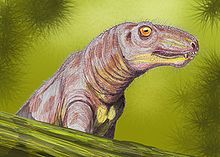Microurania is an extinct genus of therapsids from the Middle Permian first named and described by Mikhaïl Ivakhnenko.[1] It is known from a single partial skull found in the region of Orenburg, Russia. According to Kammerer, 2011, it likely represents the remains of a juvenile dinocephalian.[2]
| Microurania Temporal range: Wordian
| |
|---|---|

| |
| Scientific classification | |
| Domain: | Eukaryota |
| Kingdom: | Animalia |
| Phylum: | Chordata |
| Clade: | Synapsida |
| Clade: | Therapsida |
| Genus: | †Microurania Ivakhnenko, 1995 |
| Species: | †M. minima
|
| Binomial name | |
| †Microurania minima Ivakhnenko, 1995
| |
Skull
editMicrourania was small, with a skull of about 5 cm in length, though the postorbital portion of the skull is missing.[1] It has a leaf-like postcanine tooth similar to the one on Phthinosuchus. It was probably omnivorous.
See also
editReferences
edit- ^ a b Ivakhnenko, Mikhaïl Feodosievich (1995). "New primitive therapsids from the Permian of Eastern Europe". Paleontologicheskii Zhurnal. 29: 110–119.
- ^ Kammerer, Christian F. (June 2011). "Systematics of the Anteosauria (Therapsida: Dinocephalia)". Journal of Systematic Palaeontology. 9 (2): 261–304. doi:10.1080/14772019.2010.492645. ISSN 1477-2019. S2CID 84799772.
The main groups of non-mammalian synapsids at Mikko's Phylogeny Archive
External links
edit- Microurania minima at Palaeocritti